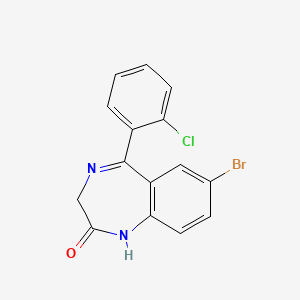

1. 7-bromo-5-(2-chlorophenyl) 1,3-dihydro-2h-1,4-benzodiazepin-2-one
2. 7-bromo-5-(2-chlorphenyl)-1,2-dihydro-3h-1,4-benzodiazepin-2-one
3. Fenazepam
4. Phenazepam, 2-(14)c-labeled Cpd
1. 51753-57-2
2. Fenazepam
3. Phenazapam
4. 7-bromo-5-(2-chlorophenyl)-1,3-dihydro-2h-1,4-benzodiazepin-2-one
5. Bd 98
6. C15h10brcln2o
7. 7-bromo-5-(2-chlorophenyl)-1,3-dihydro-1,4-benzodiazepin-2-one
8. 7-bromo-5-(2-chlorophenyl)-1,3-dihydro-3h-1,4-benzodiazepin-2-one
9. 3dsb43090z
10. 2h-1,4-benzodiazepin-2-one, 1,3-dihydro-7-bromo-5-(2-chlorophenyl)-
11. 2h-1,4-benzodiazepin-2-one, 7-bromo-5-(2-chlorophenyl)-1,3-dihydro-
12. Brn 0889456
13. Unii-3dsb43090z
14. Phenzitat
15. Phenazepam-d4 Solution
16. Chemdivam_001103
17. 7-bromo-5-(2-chlorophenyl)-2,3-dihydro-1h-1,4-benzodiazepin-2-one
18. Chemdiv1_028228
19. Phenazepam, Beta-polymorph
20. Phenazepam [mart.]
21. Mixcom6_000420
22. N05ba
23. Phenazepam [who-dd]
24. Oprea1_009938
25. Oprea1_527397
26. 5-24-04-00341 (beilstein Handbook Reference)
27. Mls001143339
28. Schembl416137
29. Zinc1919
30. Chembl1709464
31. Hms667d02
32. Dtxsid00199685
33. 5-(2-chlorophenyl)-7-bromo-1,4-benzodiazepin-2-one
34. Bd-98
35. Hms2780h09
36. Phenazepam 0.1 Mg/ml In Methanol
37. Phenazepam 1.0 Mg/ml In Methanol
38. Bcp22944
39. Stk183542
40. Akos000668996
41. Ncgc00390271-01
42. Smr000473174
43. Bcp0726000150
44. 753p572
45. Q421138
46. 7-bromo-5-(2-chlorophenyl)-1h-1,4-benzodiazepin-2(3h)-one
47. 7-bromo-5-(2-chlorophenyl)-1h-benzo[e][1,4]diazepin-2(3h)-one
48. 7-bromo-5-(2'-chloro-phenyl)-1,3-dihydro-2h-1,4-benzodiazepin-2-one
49. 7-bromo-5-(2-chlorophenyl)-1,3-dihydro-2h-1,4-benzodiazepin-2-one #
50. 7-bromo-5-(2-chlorophenyl)-1,3-dihydrobenzo[e]-1,4-diazepin-2-one 2h-1,4-benzodiazepin-2-one
51. Phenazepam Solution, 1.0 Mg/ml In Acetonitrile, Ampule Of 1 Ml, Certified Reference Material
| Molecular Weight | 349.61 g/mol |
|---|---|
| Molecular Formula | C15H10BrClN2O |
| XLogP3 | 3.3 |
| Hydrogen Bond Donor Count | 1 |
| Hydrogen Bond Acceptor Count | 2 |
| Rotatable Bond Count | 1 |
| Exact Mass | 347.96650 g/mol |
| Monoisotopic Mass | 347.96650 g/mol |
| Topological Polar Surface Area | 41.5 Ų |
| Heavy Atom Count | 20 |
| Formal Charge | 0 |
| Complexity | 415 |
| Isotope Atom Count | 0 |
| Defined Atom Stereocenter Count | 0 |
| Undefined Atom Stereocenter Count | 0 |
| Defined Bond Stereocenter Count | 0 |
| Undefined Bond Stereocenter Count | 0 |
| Covalently Bonded Unit Count | 1 |
Adjuvants, Immunologic
Substances that augment, stimulate, activate, potentiate, or modulate the immune response at either the cellular or humoral level. The classical agents (Freund's adjuvant, BCG, Corynebacterium parvum, et al.) contain bacterial antigens. Some are endogenous (e.g., histamine, interferon, transfer factor, tuftsin, interleukin-1). Their mode of action is either non-specific, resulting in increased immune responsiveness to a wide variety of antigens, or antigen-specific, i.e., affecting a restricted type of immune response to a narrow group of antigens. The therapeutic efficacy of many biological response modifiers is related to their antigen-specific immunoadjuvanticity. (See all compounds classified as Adjuvants, Immunologic.)
Anticonvulsants
Drugs used to prevent SEIZURES or reduce their severity. (See all compounds classified as Anticonvulsants.)
GABA Agents
Substances used for their pharmacological actions on GABAergic systems. GABAergic agents include agonists, antagonists, degradation or uptake inhibitors, depleters, precursors, and modulators of receptor function. (See all compounds classified as GABA Agents.)
Anti-Arrhythmia Agents
Agents used for the treatment or prevention of cardiac arrhythmias. They may affect the polarization-repolarization phase of the action potential, its excitability or refractoriness, or impulse conduction or membrane responsiveness within cardiac fibers. Anti-arrhythmia agents are often classed into four main groups according to their mechanism of action: sodium channel blockade, beta-adrenergic blockade, repolarization prolongation, or calcium channel blockade. (See all compounds classified as Anti-Arrhythmia Agents.)